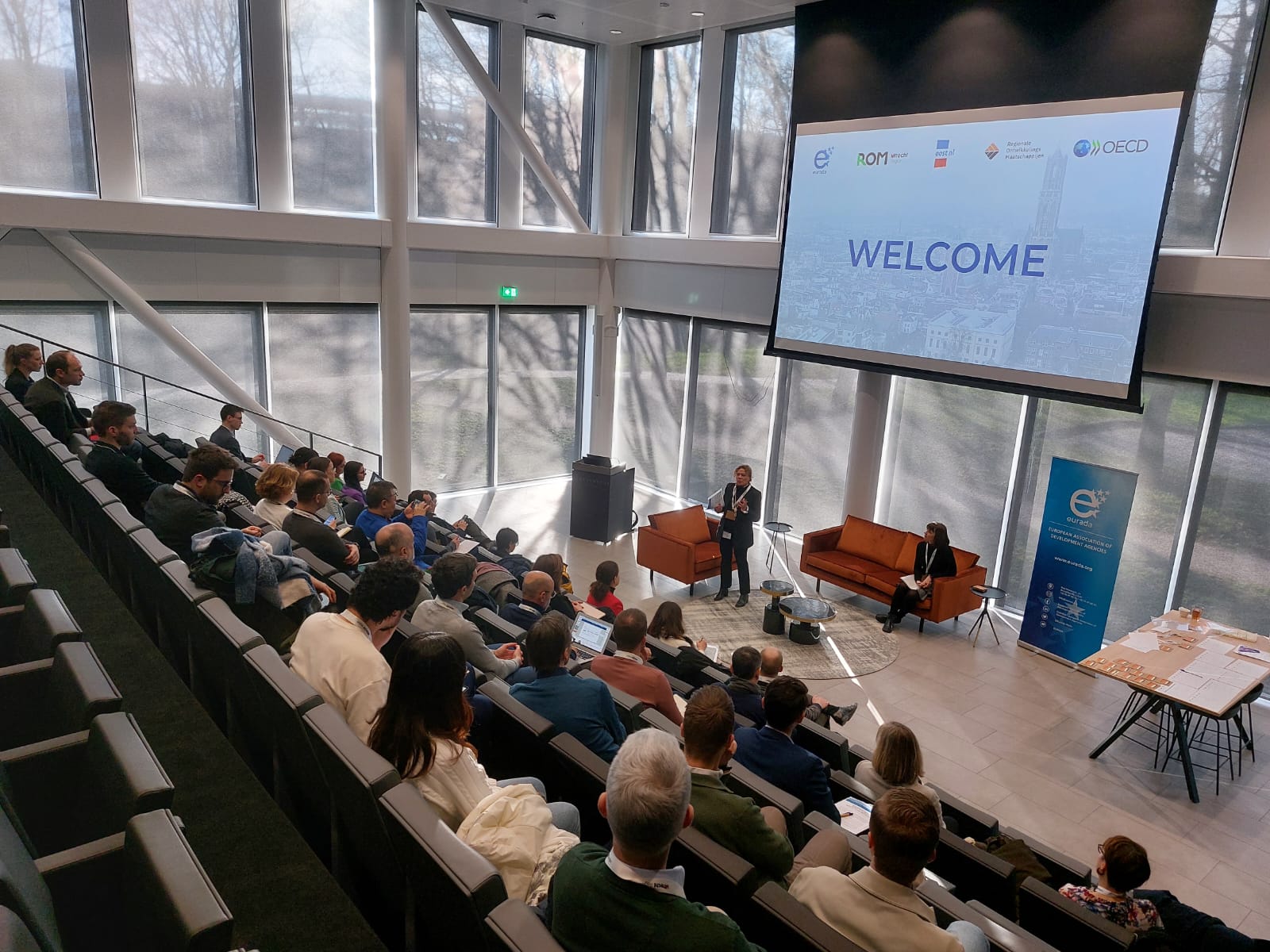28 participants from 13 different European countries explored the role of regions and regional development agencies in addressing socio-economic challenges and megatrends. This was done by concentrating on foresight and interaction.
The Winter School, jointly organised with the OECD and our two Dutch members ROM Utrecht and Oost NL, provided a dedicated session on Strategic Foresight. The primary objective of this workshop was to highlight the emerging importance of foresight within international organisations and governments as a tool to anticipate and prepare for potential future scenarios. However, it was acknowledged that the application of foresight at the local level has been limited, mainly due to a lack of comprehensive understanding of foresight methodologies among local actors, who are more inclined to address immediate operational needs.
During the workshop, a pivotal exercise was conducted in which participants were divided into four groups. The task assigned to each group was to define clear and achievable goals for the years 2025, 2040, and 2050, representing short-term, medium-term, and long-term horizons, respectively. This exercise allowed participants to identify the challenges and obstacles that Regional Development Agencies (RDAs) may face over these periods.
Day 1 took place at the Utrecht Scientific Park and the afternoon sessions were primarily dedicated to two main topics: the startup incubator and impact investment. From 2009 to 2022, the Utrecht Scientific Park supported 350 startups with a total funding budget of €4 billion and with an excellent 63% survival rate. In total, thanks to the Startups Incubator, more than 5.000 jobs have been created over the past 15 years. The incubator mostly supports startups in the health, education and sustainability sectors. The challenges faced by startups and scaleups in the Dutch ecosystems were also discussed, with particular attention to access to funding, international networks and markets.
Our member Theo Follings from Oost NL presented the innovative power of the eastern part of the Netherlands and in particular the Think East NL network example. With over 30 partners, Think East Netherlands is the platform in East Netherlands where our Dutch member works together on innovative solutions for a healthy and sustainable future for everyone.
Day 2 took place in Arnhems Buiten, an energy campus which should become an innovation cluster by 2030. This space belongs to the real estate portfolio of Oost NL. Wendy de Jong, Director of Oost NL, welcomed the participants highlighting the crucial role played by the cooperation of RDAs at the national level in ensuring regional profiles to create joint impacts. Michiel Scheffer, President of the Board of the European Innovation Council (EIC), was one of the speakers at the Winter School. He explained in detail the peculiarity of the EIC Horizon calls. The ultimate goal is to make an industrial renaissance in Europe by creating a European value chain.
On the afternoon of 28 February, a session entirely dedicated to the future of RDAs took place. Speakers and participants explored the strategic role that RDAs can and should play in addressing contemporary societal challenges. A workshop was also organised focusing on three axes for further discussion: investment, innovation, and internationalisation. Overall, this session aimed to foster a debate/workshop on how RDAs can orient, adapt, and develop their strategies, policies, and programmes, drawing from examples of Public-Private Partnerships.
The third and last day of the EURADA Winter School was held at the main venue of the Utrecht Municipality. Michiel Dijkam, Head of the Economic Board Utrecht, illustrated the success story of Utrecht in cooperating with all the actors included in the triple helix at the metropolitan level. Fons de Zeeuw, International unit at Oost NL, analysed the concept of Strategic Autonomy, which aims to ensure the ability to cope alone if necessary, but without ruling out cooperation whenever possible. This intervention generated a vibrant debate among all the participants and was consequently identified as a topic that could be better addressed in a future EURADA event.
The last speaker of these intense 3 days of Winter School was Cristian Matti from the Joint Research Center. He showcased the most recent publication of the Commission on Innovation for place-based transformations, an ACTIONbook for building partnerships for the green and digital transitions. As stressed by Matti, regions, as spaces for experimentation, allow different actors to shape conditions, as they are closely linked to industrial sectors, natural resource management and people's lifestyles.
In conclusion, the 2nd edition of the Winter School was a great success, as was the first one. Some EURADA members already volunteered to host us for the 3rd edition in 2025. Both speakers and participants expressed satisfaction with the Winter School outcomes, highlighting the participants' better understanding of foresight thinking, the deepening of knowledge of innovation methods and the acquisition of knowledge about foresight practices in various sectors.
